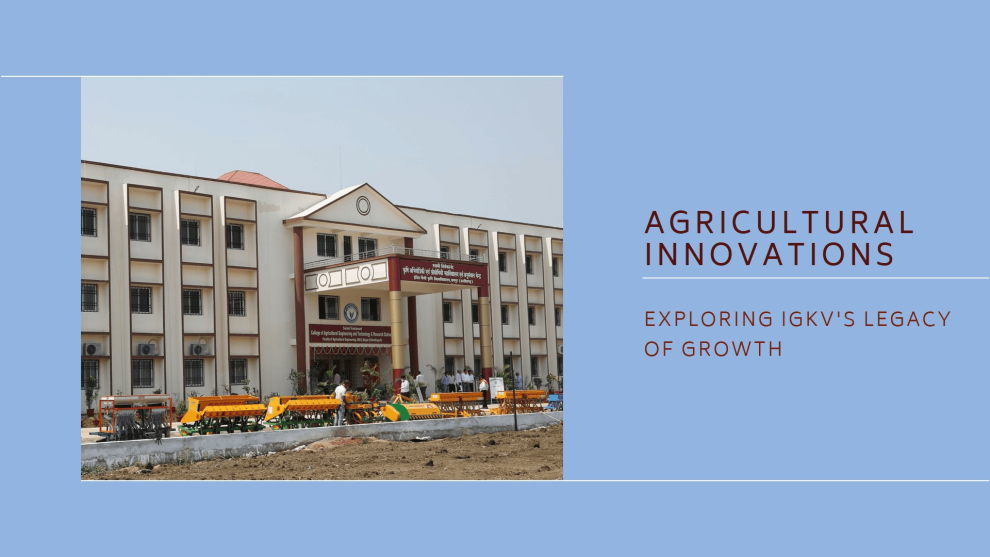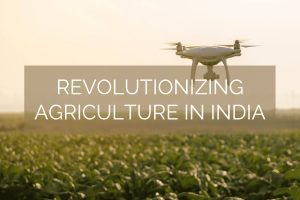Indira Gandhi Krishi Vishwavidyalaya (IGKV), Raipur, is an esteemed autonomous agricultural university located in the heart of Chhattisgarh, India. Established to advance agricultural education, research, and extension, IGKV plays a pivotal role in uplifting the livelihoods of farmers and driving sustainable agricultural development across the state.
Historical Journey
- IGKV traces its roots back to 1903 with the establishment of an agricultural research station at Labhandi Farm during the British era.
- It evolved into the Rice Research Station in the mid-1960s and was later renamed the Madhya Pradesh Rice Research Institute in 1974 under Dr. R. H. Richharia’s leadership.
- The College of Agriculture, Raipur, was established in 1961. In 1987, the institution officially became Indira Gandhi Krishi Vishwavidyalaya.
Vision and Mission
Vision
To ensure sustainable agricultural development, enhance rural livelihoods, and promote economic growth in Chhattisgarh through education, research, and innovation.
Mission
To improve the agricultural sector’s productivity, sustainability, and competitiveness while ensuring food and nutritional security. This is achieved by efficient natural resource management and fostering innovation.
Educational Programs
IGKV offers diverse programs across two main faculties:
- Faculty of Agriculture
- Faculty of Agricultural Engineering
Degree Programs
- Undergraduate (UG):
- Bachelor of Science in Agriculture (Hons)
- Bachelor of Technology in Agricultural Engineering and Food Technology
- Postgraduate (PG):
- MBA in Agribusiness Management
- M.Sc. in Forestry, Agriculture (12 disciplines), Horticulture (3 disciplines)
- M.Tech. in Agricultural Engineering
- Doctoral (Ph.D.):
- Offered in 19 disciplines of Agriculture, Horticulture, and Agricultural Engineering.
Student Enrollment (2023-24):
- UG: 2,779 intake capacity, 2,056 enrolled
- PG: 629 intake capacity, 561 enrolled
- Ph.D.: 165 intake capacity, 135 enrolled
- Total enrollment: 11,592 students
Research and Innovation
IGKV is a leader in agricultural research with:
- 28 constituent colleges and 11 affiliated colleges
- 27 Krishi Vigyan Kendras (KVKs) and 8 research centers across Chhattisgarh
- Focus on developing region-specific, sustainable agricultural technologies.
Centers of Excellence
- Medicinal and Aromatic Plants
Established in 2014-15 for advanced research and development of non-timber forest produce. - Protected Cultivation and Precision Farming
Operational since 2015, focusing on modern agricultural practices. - Agro-Industrial Biotechnology
Founded in 2016 to train professionals and develop bio-control agents and fertilizers.
Campus Facilities
IGKV offers a rich campus life with modern infrastructure:
- Hostels: Separate accommodation for male and female students.
- Auditoriums: Three facilities with a combined capacity of 4,700.
- Library: The Nehru Library houses over 100,000 resources and offers e-services.
- Sports: Facilities for football, volleyball, cricket, badminton, and more, along with gymnasiums.
- Medical Support: On-campus clinic for emergencies.
- Cafeteria: Affordable and nutritious meals for students and staff.
Placements and Entrepreneurship
IGKV’s dedicated placement cell ensures students secure opportunities in:
- Organizations like Food Corporation of India, State Bank of India, IFFCO, and Nuziveedu Seeds.
Agri-Startup Incubator (R-ABI)
- Supported by the Ministry of Agriculture, it provides incubation space, mentoring, and seed funding (₹5–25 lakhs).
- Has assisted 70,000+ farmers and generated ₹85 crore in startup revenue.
Achievements
- Ranked 10th to 23rd among agricultural universities by ICAR from 2016 to 2020.
- Notable student successes in national-level exams: 75 JRFs, 7 SRFs, 157 NET qualifiers, and 31 ARS qualifiers.
- Holds one of the largest rice germplasm collections globally, with 23,250 varieties.
Collaborations
IGKV has established partnerships with leading national and international organizations, including:
- ICRISAT, IRRI, and APAARI for global agricultural advancements.
- MOUs with 67 national institutions, such as ICAR institutes, BARC, and ISRO.
Conclusion
Indira Gandhi Krishi Vishwavidyalaya is not just an academic institution but a beacon for agricultural progress and rural empowerment. By fostering innovation and maintaining its commitment to sustainability, IGKV is ensuring a bright future for agriculture in Chhattisgarh and beyond.












Add Comment